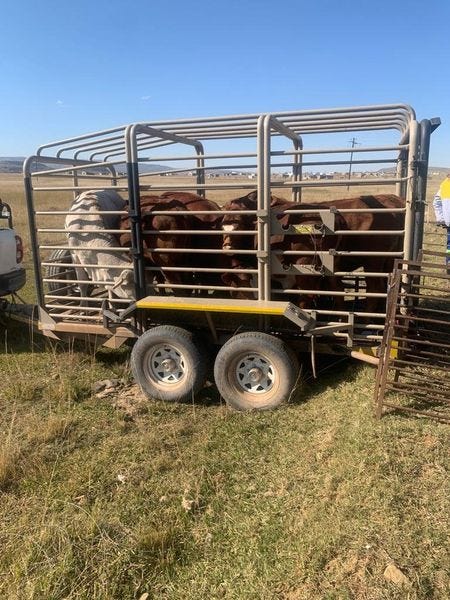1. Newsletter Update:
We have 788 subscribers, with our 27th edition receiving 536 reads.
This week, our Article of the Week explores DPWI Security Thwarts Armed Thugs in Attack on Government Property. Bonus content is Livestock theft a headache for eastern Free State police. Included is our tips for answering the interview question "How Can You Deal with a Person Experiencing Heightened Emotions Such as Anger and Aggression?", and a spotlight on: The Role of a Branch Manager in the Security Industry.
Subscribe for free today to stay informed and receive your Bi-monthly copy!
2. Announcements:
Why would you want to complete your online cv on the Security Jobs Finder Website?
The aim of Security Jobs Finder is to make it as easy as possible for job seekers to find work by making completed CV’s available to recruiters registered on our system. Recruiters can then sort through the CV’s they need per area and then contact the selected candidates directly when they need you.
It shouldn’t take you longer than 30 minutes to complete your online CV.
It is FREE to register and complete your CV.
Make sure to verify your email address and cellphone number so recruiters are able to contact you.
This weeks social media advert:
3. DPWI Security Thwarts Armed Thugs in Attack on Government Property
Civil Security Published on 23 January 2025 By ProtectionWeb
The Department of Public Works and Infrastructure (DPWI) has raised alarm over the escalating wave of infrastructure vandalism, including the theft of aluminium, cables, and steel, and the destruction of critical assets like traffic lights, railway lines, and pylons. In a recent brazen incident, armed criminals targeted Public Works House in Pretoria’s Central Business District, attempting to strip the property of aluminium, steel, and other valuable materials.
On the evening of 22 January 2025, security personnel stationed at the government building confronted the group, who were armed with dangerous weapons. The group is alleged to have carried out similar acts of vandalism in the area. The confrontation resulted in two suspects being shot while the others fled. The group reportedly used pangas to intimidate and attack security guards as they attempted to steal materials likely intended for sale to scrap metal dealers.
Public Works House has been a frequent target of criminal activity, with incidents of fencing and infrastructure theft becoming alarmingly common. The DPWI has expressed concerns about the connection between these acts of vandalism and the illicit scrap metal trade, which undermines both the economy and vital infrastructure.
The injured suspects were transported to the hospital, and security personnel involved in the incident are being questioned as part of an ongoing police investigation. The department has pledged to enhance security measures at all public assets, reaffirming its commitment to safeguarding infrastructure meant to serve the public good.
Source: https://www.protectionweb.co.za/opinion-and-analysis/fighting-a-common-enemy-the-role-of-private-security-in-counterterrorism/
4. Interview Q & A
How to Answer the Interview Question: How Can You Deal with a Person Experiencing Heightened Emotions Such as Anger and Aggression?
In the security industry, dealing with individuals who are angry, aggressive, or emotionally distressed is a common challenge. Whether it’s a disgruntled employee, an unruly customer, or a potential intruder, security professionals must be equipped to handle these situations calmly and effectively.
During a job interview, you may be asked, “How can you deal with a person experiencing heightened emotions such as anger and aggression?” Employers ask this question to assess your ability to de-escalate conflicts, maintain professionalism, and ensure safety without resorting to unnecessary force.
Here’s how to craft a strong response to this critical interview question.
1. Demonstrate Your Understanding of Conflict De-escalation
Start by showing that you understand the importance of remaining calm and professional when dealing with emotionally charged individuals. Explain that reacting with aggression or hostility can escalate the situation, making it harder to resolve peacefully.
Example Response:
"In my experience, the key to dealing with an aggressive or angry person is to remain calm, composed, and professional at all times. It’s important not to take their anger personally and to focus on de-escalating the situation rather than reacting emotionally."
2. Emphasise the Use of Verbal De-escalation Techniques
Employers want to know that you can defuse tense situations without resorting to physical intervention. Highlight your knowledge of verbal de-escalation techniques, such as:
Using a calm and steady voice to avoid further agitation.
Listening actively to the person’s concerns without interrupting.
Showing empathy and understanding of their frustration.
Using open body language to appear non-threatening.
Offering solutions to help resolve the issue.
Example Response:
"When confronted with an aggressive individual, I first ensure my tone and body language remain non-threatening. I listen to their concerns attentively, allowing them to express their frustrations while maintaining eye contact and nodding to show understanding. If possible, I try to acknowledge their emotions and offer a solution that can help diffuse the tension. In many cases, simply showing empathy and validating their feelings can significantly reduce hostility."
3. Explain the Importance of Setting Boundaries and Controlling the Environment
Security professionals must balance de-escalation with maintaining control of the situation. This means setting firm yet respectful boundaries and ensuring the environment remains safe.
Maintain a safe distance to avoid potential physical confrontation.
Use clear and direct instructions if the person becomes threatening.
If necessary, request backup or involve law enforcement.
Example Response:
"While I always prioritise verbal de-escalation, I also understand the need to set firm but respectful boundaries. If someone becomes physically aggressive or refuses to calm down, I maintain a safe distance and clearly communicate that I am there to help but will not tolerate violence. If the situation escalates beyond my control, I follow protocol by calling for assistance or notifying law enforcement."
4. Highlight Your Ability to Stay Professional and Follow Protocol
Employers want security personnel who can handle tense situations without losing control. Reinforce your ability to:
Follow company policies and procedures when dealing with aggression.
Use non-violent crisis intervention techniques if trained to do so.
Document and report the incident accurately after it is resolved.
Example Response:
"As a security professional, I understand that handling aggressive individuals requires patience, professionalism, and strict adherence to company protocols. After the situation is resolved, I ensure that I document the incident accurately, noting any details that may be important for management or law enforcement."
Final Sample Answer
If you want to combine all the elements above into a structured response, here’s a complete answer you can use:
"When dealing with a person experiencing heightened emotions such as anger or aggression, my priority is to remain calm and professional. I use verbal de-escalation techniques such as speaking in a calm tone, listening actively, and showing empathy to help defuse the situation. I also ensure that I maintain a safe distance and use open body language to avoid escalating tensions. If the individual becomes a physical threat, I set firm boundaries while following company protocols to ensure safety. If needed, I call for backup or notify law enforcement. Once the situation is under control, I document the incident thoroughly for reporting purposes. My goal is always to resolve conflicts peacefully while ensuring the safety of everyone involved."
Key Takeaways
Stay calm and professional – never match aggression with aggression.
Use verbal de-escalation techniques to diffuse tensions.
Set boundaries and control the environment to ensure safety.
Follow company policies and document incidents properly.
By preparing a structured answer like this, you can confidently demonstrate to your interviewer that you have the necessary skills to handle difficult situations professionally and effectively.
5. The different career options available in the security field:
The Role of a Branch Manager in the Security Industry
The security industry plays a crucial role in safeguarding businesses, individuals, and assets. At the helm of security operations within a specific location or region is the Branch Manager—a key figure responsible for overseeing all aspects of security services within their jurisdiction. This role requires a blend of leadership, operational management, and customer service skills to ensure smooth functioning, compliance, and high service standards.
Key Responsibilities of a Branch Manager
A Branch Manager in the security industry is responsible for the overall operations of their branch, including workforce management, client relations, financial oversight, and compliance with industry regulations. Below are the primary duties associated with this role:
1. Leadership and Staff Management
The Branch Manager oversees a team of security personnel, administrative staff, and supervisors, ensuring that all employees are well-trained, disciplined, and motivated. Responsibilities include:
Recruitment and training of security officers and support staff.
Supervision and performance monitoring to ensure high standards of service.
Scheduling and rostering to ensure optimal deployment of security personnel.
Conflict resolution and handling staff grievances professionally.
2. Operational Oversight
Efficient operations are essential for a security branch to run smoothly. The Branch Manager ensures that all security services are delivered effectively by:
Implementing standard operating procedures (SOPs) for various security functions.
Conducting site inspections and ensuring proper deployment of guards.
Ensuring that security equipment, such as CCTV systems and alarm systems, is maintained and operational.
Investigating incidents and ensuring proper incident reporting procedures are followed.
3. Client Relations and Business Development
A major aspect of the Branch Manager’s role is maintaining client satisfaction and seeking new business opportunities. This involves:
Acting as the main point of contact between the company and clients.
Conducting regular client meetings to assess service quality and address concerns.
Identifying opportunities for contract renewals and new business acquisition.
Handling client complaints and service escalations professionally.
4. Financial Management
Security is a business, and the Branch Manager is responsible for ensuring financial viability by:
Managing budgets and operational expenses.
Overseeing payroll and billing processes.
Ensuring cost-effectiveness while maintaining high-quality service.
Preventing unnecessary expenditure and maximising profitability.
5. Compliance and Risk Management
Security companies must comply with industry regulations, labour laws, and safety protocols. The Branch Manager ensures:
Compliance with PSIRA (Private Security Industry Regulatory Authority) regulations and other legal requirements.
Adherence to health and safety protocols to protect both security personnel and clients.
Regular risk assessments and audits to identify and mitigate potential security threats.
Proper incident reporting and liaison with law enforcement agencies when necessary.
Essential Skills of a Branch Manager
To be effective in this role, a Security Branch Manager must possess the following skills:
Leadership & People Management – The ability to inspire, train, and manage a large security workforce.
Operational Efficiency – Strong organisational skills to handle multiple security operations simultaneously.
Client Relationship Management – Effective communication and problem-solving skills to build strong client partnerships.
Financial Acumen – The ability to manage budgets and control costs.
Crisis Management & Problem-Solving – The capacity to make quick, strategic decisions in emergencies.
Regulatory Knowledge – Understanding security industry laws and compliance requirements.
The Importance of a Security Branch Manager
A Branch Manager serves as the backbone of security operations, ensuring that services are delivered efficiently, staff are managed effectively, and clients are satisfied. Their role directly impacts the reputation and success of the security company. Without strong leadership at the branch level, security firms risk inefficiencies, client dissatisfaction, and potential compliance violations.
Conclusion
The Branch Manager in the security industry is a critical leadership role, balancing operational excellence, staff management, client relations, and financial oversight. Their ability to ensure high-quality security services makes them indispensable to any security firm. For those seeking a challenging yet rewarding career in security management, this role offers opportunities for growth, leadership, and strategic decision-making.
6. Livestock theft a headache for eastern Free State police
defenceWeb - 11th February 2025
In addition to being an area where livestock roams – not always of own volition – in search of grazing, police and soldiers on the eastern Free State border with landlocked Lesotho have to contend with livestock theft.
Evidence of this came from Police Minister Senzo Mchunu in response to a question by Patriotic Alliance (PA) National Assembly (NA) public representative, Tandiswa Marawu.
She was informed police dealt with 1 283 cases of stolen cattle in Ficksburg and surrounds in the 2023/24 financial year. This ties in with what a Parliamentary oversight committee was told in October. While on an oversight visit to eastern Free State, the National Council of Provinces (NCOP) select committees tasked with agriculture, land reform and mineral resources and economic development and trade heard Golden Gate Highlands National Park, 100km from Ficksburg, was used as “a corridor” to move stolen livestock, mostly cattle but also horses from commercial farms, across the border.
Soldiers deployed on this stretch of South African land border regularly find themselves rounding up and herding cattle, goats and sheep grazing on land owned and managed by South African agri-businesses. In April last year, as an example, soldiers deployed on this border in terms of Operation Corona saw to it livestock worth R5 million plus was taken off South African pastureland and moved to either police impound areas or other suitable sites until claimed and the applicable fines paid.
Mchunu assured his questioner no registered police firearms were involved in the 1 200 plus livestock thefts investigated in Ficksburg and surrounds.
He further informed Marawu “the mandate of the [SA Police Service] stock theft and endangered species unit is to investigate all cases of stock theft and crimes related to endangered species, without any exception”.
On rural safety and cross-border crime Mchunu said there were regular cross-border and bilateral operations between Free State police and the Lesotho Mounted Police. Rural safety committees and stock theft forums are in place at station, district and provincial levels to deal with rural safety in general. This includes planning joint operations, conducting intelligence briefings, attending to reported cases and providing feedback on the status of cases to complainants.
There are also, what the Ministerial reply terms “blue-white-light” weekly operations in rural areas, in conjunction with communities and private sector security companies addressing general and cross-border crime.
Source: https://www.defenceweb.co.za/security/border-security/livestock-theft-a-headache-for-eastern-free-state-police/
In conclusion:
That’s it for this week’s edition! We hope you found it informative and of value. Don’t forget to like, subscribe, and share with your colleagues.
We’d love to hear from you—leave your feedback or ideas for articles in the comments. Your input helps shape future content and ensures the newsletter remains valuable to you.
If you haven’t signed up and completed your online cv on the Security Jobs Finder Website, yet click here: www.securityjobsfinder.co.za/







